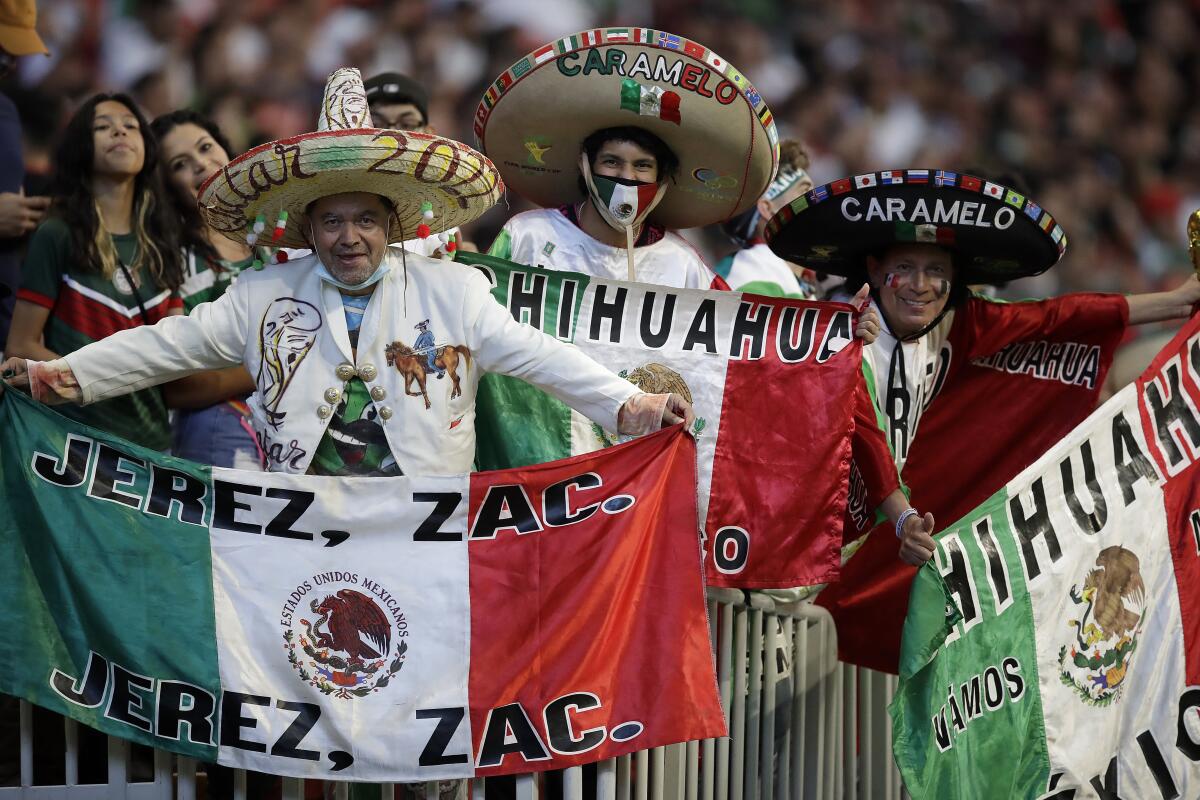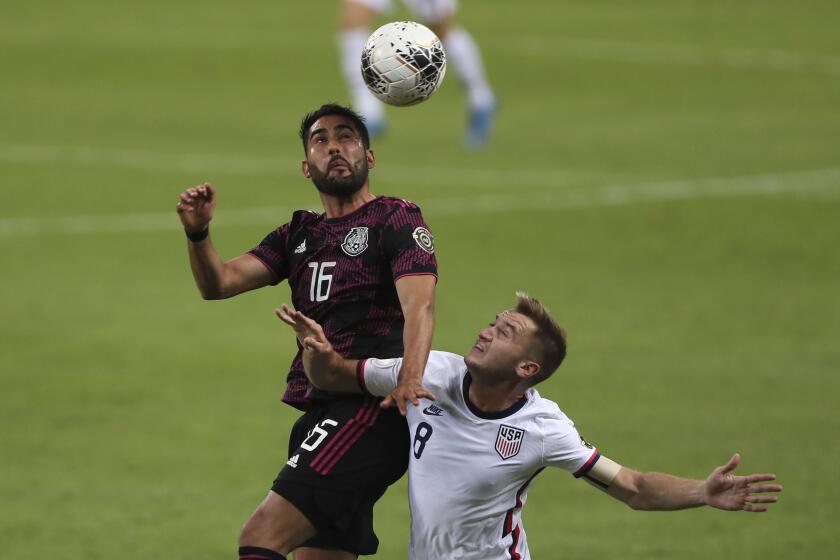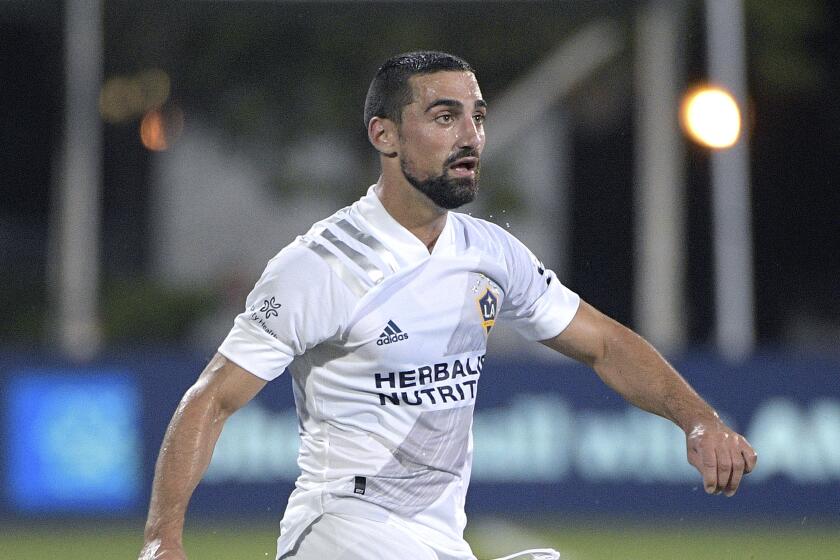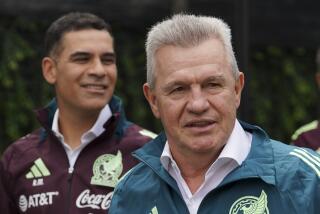Mexico to play two World Cup qualifiers without fans due to use of homophobic chant

- Share via
Mexico’s national team will play its first two home matches in World Cup qualifying without spectators, a penalty for its fans’ use of an anti-gay chant during last spring’s pre-Olympic tournament in Guadalajara, the country’s soccer federation announced at a Mexico City news conference Friday.
The games Mexico will play behind closed doors are against Jamaica on Sept. 2 and Canada on Oct. 7. The federation was also fined $73,000 following an investigation by FIFA, the world governing body for soccer.
“What for some seemed to be fun, I have news for you. It isn’t,” Yon de Luisa, the president of the Mexican federation, said at the new conference. “Because of it we’re kept out of the stadium and kept away from our national team. Please stop. Stop now.”
The actions are the strongest ever taken against Mexico for the chant and more sanctions could be coming. FIFA is said to still be looking into the use of the chant during four recent games in the U.S., three of which were halted by officials because of fan behavior.
The Mexican soccer federation is warning fans that FIFA has authorized referees to stop play and suspend matches if they keep using a homophobic slur.
Mexico’s loss to the U.S. in the Nations League final in Denver was also marred by a pitch invader and by fans who threw debris on the field, including a heavy object that struck American player Gio Reyna in the face, sending him to the locker room. Denver police said several fans were ejected and five others were arrested.
Mexico’s next two games are friendlies, June 30 against Panama in Nashville and July 3 with Nigeria at the Coliseum, followed by the CONCACAF Gold Cup. Neither will be affected by the penalties announced Friday.
The banned behavior happened despite an education campaign waged by the federation, which has warned that violations of the anti-discrimination protocol would not be tolerated.
Past fines haven’t worked, either. Mexico was fined nine times over its fans’ use of the chant during qualifying for the 2018 World Cup — 14 other national federations were also fined. However, the penalties were generally so small, they had little effect.
But when the chant was heard during Mexico’s World Cup opener in Russia, FIFA threatened to ban the team’s supporters from subsequent games and the behavior stopped.
The origins of the chant have mostly been lost to history, but it is believed to date to a Mexican club match in 2007 and is generally used when the opposing goalkeeper makes a goal kick. There is vigorous debate over whether the chant is derogatory since the offending word can have many meanings in Spanish, one of which is a slur used to demean gay men.
De Luisa has said that conversation is meaningless.
“For many years, that was the debate for us at the Mexican federation,” he said. “That is no longer a debate. If it is discriminatory, we should avoid it.”

Members of Pasión 1927, a Los Angeles-based fan group of the Mexican national soccer team, share their thoughts on a popular chant that is widely considered homophobic.
Twenty-three months ago, FIFA announced a series of guidelines to combat offensive language and actions by fans. At the first offense, officials are to stop the match and request a public-service announcement calling on spectators to cease the discriminatory behavior. If the behavior continues, the match can be halted again and the players can be sent to their locker rooms.
If play is halted a third time, officials are instructed to abandon the match. In addition, fans identified by security or other spectators as having used the chant can be ejected from the stadium.
In a competitive game, continued use of the chant could result in a forfeiture while the abandonment of a friendly could cost a team valuable points in the FIFA world rankings, which help determine seeding for tournaments such as the World Cup.
Those procedures began being implemented in Mexico’s domestic Liga MX games in 2019 and the results have generally been positive, De Luisa said. The reaction has been different in the U.S.
“There’s a million ways to show interest toward your team. Without discriminating,” he said. “So we should focus on the positive ways. This is something that we are not proud of. This is not the image that we want to show from our fans and from our society to the rest of the world.”
MLS suspends Galaxy’s Sebastian Lletget for two games after review of his use of a homophobic slur in video posted on social media.
He pointed to the singing of “Cielito lindo,” a traditional mariachi tune that fans have turned into a theme song for Mexican teams.
“Whenever we sing that, in any country — and in many World Cups it has been sung — that is something that we should be proud of,” he said.
The chant has also been heard at several MLS games in recent years, including ones at Dignity Health Sports Park, where the Galaxy play, and at LAFC matches at Banc of California Stadium. The league and the individual teams immediately addressed the issue and the behavior ceased.
MLS also acted strongly again this spring when it suspended Galaxy midfielder Sebastian Lletget for two games after he posted a video to Instagram in which he used the same offensive term during a playful exchange with a teammate. Lletget quickly took down the video and apologized.











